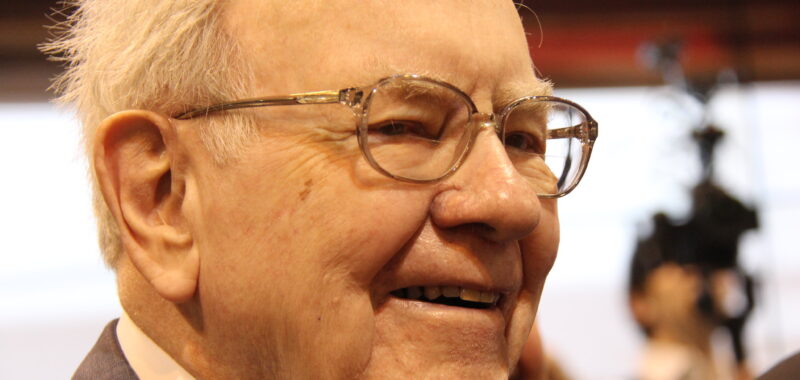One of the Oracle of Omaha’s favorite stocks to buy is a historically cheap legal monopoly.
Wall Street is full of prominent money managers, but few if any can hold a candle to the affably named “Oracle of Omaha,” Warren Buffett. Since taking the reins at Berkshire Hathaway (BRK.A -0.22%) (BRK.B -0.30%) in the mid-1960s, Buffett has overseen a cumulative return in his company’s Class A shares (BRK.A) of almost 5,700,000%, as of the closing bell on Nov. 6.
However, it’s not just Buffett’s outperformance of the benchmark S&P 500 that’s endeared him to the investing community. People also appreciate his openness when discussing the U.S. economy, stock market, and the traits he looks for in individual investments.
Based on the latest round of Form 13F filings — this filing allows investors to see which stocks Wall Street’s leading asset managers are buying and selling — and Form 4 filings, Buffett and his team have been doing a lot more selling than buying. But there’s one unique stock-split stock that the Oracle of Omaha can’t seem to get enough of and clearly wants to own as we ready to turn the page to 2025.

Berkshire Hathaway CEO Warren Buffett. Image source: The Motley Fool.
Warren Buffett has been a net seller of stocks for eight straight quarters
For decades, Buffett has been a long-term optimist — and that hasn’t changed. He’s repeatedly cautioned investors not to bet against America, which reflects a keen understanding that periods of economic expansion and bull markets on Wall Street last significantly longer than economic recessions and bear markets.
But Buffett’s long-term ethos does, occasionally, get in the way of his steadfast focus on value.
At the moment, the stock market is historically pricey. The market-cap-to-gross-domestic-product indicator Buffett praised in 2001 (now known as the “Buffett Indicator”) hit an all-time high of 208% last week and is well above its historic average of 85%, dating back to 1970.
Furthermore, the S&P 500’s Shiller price-to-earnings (P/E) Ratio, which is also known as the cyclically adjusted P/E ratio (CAPE Ratio), closed at 38.88 on Dec. 6. Aside from being more than double its 153-year average of 17.17, it marks the third-highest reading during a continuous bull market in history. Previous readings above 30 have eventually led to declines of 20% to 89% in Wall Street’s major stock indexes.
With little in the way of value to be found, the Oracle of Omaha has overseen more stock sales than purchases (based on Berkshire’s consolidated cash flow statements) for eight consecutive quarters. Though cumulative net-selling activity totals $166.2 billion, more than $127 billion in net sales have occurred this year. In short, Buffett has been more critical than ever of value in 2024.
But there is one historically cheap top stock that’s caught his attention.

Image source: Getty Images.
The Oracle of Omaha is piling into this historically cheap legal monopoly
Based on a couple of Form 4 filings from Berkshire Hathaway in October — Form 4 is a mandatory filing when shareholders own more than 10% of a company’s outstanding shares — one of Warren Buffett’s top stocks to buy for 2025 is none other than satellite-radio operator Sirius XM Holdings (SIRI -12.25%). Berkshire spent $189.8 million buying additional shares of Sirius XM in October.
Sirius XM is part of the “Class of 2024” stock-split stocks; but it’s unique. Nearly all of the most prominent stock-split stocks this year were of the forward variety. A forward split is designed to reduce a company’s share price (and correspondingly increase its share count) to make it more nominally affordable for retail investors who lack access to fractional-share purchasing through their broker.
Sirius XM is the only brand-name company to complete a reverse stock split this year. Normally, reverse stock splits are conducted to maintain minimum share price listing standards on a major stock exchange. In other words, this type of split is usually completed from a position of operating weakness.
But this wasn’t the case with Sirius XM, which was never in danger of delisting. Rather, it enacted a 1-for-10 reverse split to get its stock back on the radar of institutional investors, who sometimes won’t purchase stocks trading below $5 per share. This makes Sirius XM’s stock split unique.
However, Buffett’s fascination with Sirius XM likely has nothing to do with its now-higher nominal share price and everything to do with its sustainable moat and historically cheap valuation.
The clearest competitive edge for Sirius XM is that it’s a legal monopoly. While it is still competing for listeners with terrestrial and online radio operators, it’s the only licensed satellite-radio provider. Having this distinction affords Sirius XM significant subscription pricing power.
Sirius XM also brings a level of cost transparency to the table that traditional radio companies lack. Regardless of how many subscribers the company has, transmission and equipment expenses are going to be relatively fixed from one quarter to the next. If Sirius XM can grow its subscriber count over time, this should be a recipe for improved margins.
Another huge advantage for Sirius XM is how it generates its revenue. Whereas terrestrial and online radio companies rely almost exclusively on advertising, Sirius XM has netted close to 77% of its sales from subscriptions through the first nine months of 2024. During recessions, ad revenue can dry up quickly. By comparison, Sirius XM’s subscribers are less likely to cancel their service than businesses are to reduce their ad spending. This distinction gives Sirius XM a safer path to navigate during a recession.
Lastly, Sirius XM Holdings is a cheap stock in a very pricey market. It’s trading at 8.5 times forecast earnings for 2025, which represents a 46% discount to its average forward P/E ratio over the trailing-five-year period. When coupled with a 3.8% dividend yield, it’s easy to see why Sirius XM is a top stock Warren Buffett wants to own in 2025.

